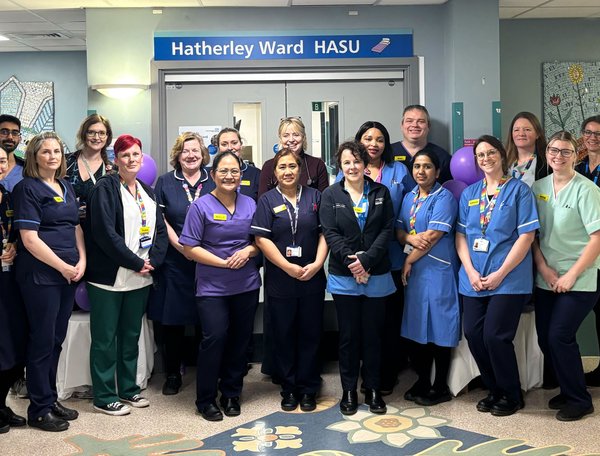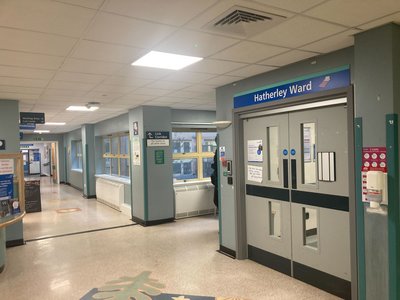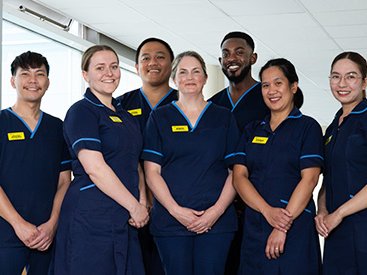Recovery in Focus: A Patient’s Journey Through Gloucestershire’s Stroke Centre of Excellence
Providing timely and appropriate care in the most suitable setting is essential for stroke patients’ long-term recovery.
Our Stroke team are dedicated to providing high-quality stroke services that make a difference to patients and their families every day.
A stroke can have lasting consequences, but early access to specialist intervention and ongoing rehabilitation support can significantly reduce its impact and help individuals regain their independence.
Gloucestershire’s stroke care model is grounded in national best practice, prioritising timely and location-appropriate treatment. Healthcare teams across various services collaborate closely to support patients - whether in the acute hospital setting, our purpose-built community rehabilitation facility or within the comfort of their own homes.
A Patient’s Perspective: Awal’s Stroke Recovery Journey
To bring the patient experience to life, we spoke to Awal, who recently went through a stroke and recovery journey supported by our stroke services across Gloucestershire. Here, he shares his story from the moment of his stroke to the care he received through to the lifestyle changes he’s made since.
What happened during your stroke and how was the treatment you received?
"In my case, the most important thing was that my wife called an ambulance as soon as she suspected something was wrong.
"When I arrived at Cheltenham General Hospital, I don’t remember much. But my wife tells me I was taken straight into the hyper acute stroke unit for immediate treatment to stabilise me.
"There were daily visits from the stroke doctors, led by Dr Hellier, which I found very reassuring. The nurses on the ward were also incredibly supportive, helping with food and personal care when I couldn’t do things myself. The rehab team began working with me early on. They started me on exercises to help regain movement in the side of my body that had been affected.
"After a period at Cheltenham General, I was transferred to Vale Community Hospital to continue rehabilitation in a specialist setting. That was where I was given a walking stick, which represented big step on my journey back to independence.
"Once I’d made enough progress, I was discharged from hospital and supported by the Early Supported Discharge (ESD) team at home. They did a brilliant job helping me with rehab in the comfort of my own space for a few more weeks.
"I’m still taking three medications, but I’ve regained a great deal of independence. I’ve even travelled to Ireland and Ghana without any issues. I can now walk up to three miles at a time. The only thing I haven’t managed yet is running - but that’s my next goal."
"The event came as a shock. We have no family history of stroke and it was never something I’d even considered might happen to me."
Dr Awal Fuseini
How did you find the care and support you received?
"It was very reassuring to have doctors visit us on the ward every day. They gave us regular updates and were always ready to answer questions.
"The nurses were supportive and attentive, and I want to mention the catering and cleaning staff too - everyone played a part in our care and recovery.
"Overall, I would rate the care I received as excellent. I’m taking every precaution now to stay well and avoid a return to hospital."
Life after stroke: progress and challenges
"The stroke has completely changed my life. I’ve made big changes to my diet — no more sugar in my tea, reduced carbohydrates, and I avoid foods with a high glycaemic index. I’ve lost over 10kg as a result.
"I’ve regained movement in both my arm and leg, although I still walk with a slight limp, which most people don’t notice. I do get tired more easily now, so I make sure to rest whenever I need to."
Looking Ahead
Awal’s story is a powerful reminder of how swift action, specialist care and personalised rehabilitation can support stroke survivors on the path to recovery. His determination and positive mindset, combined with the coordinated efforts of our stroke teams across hospital and community settings, show what’s possible when care is truly joined-up.
We thank Awal for sharing his journey and inspiring others who may be facing a similar road to recovery.
"All things considered, I count myself very lucky. I’ve survived something serious and come out of it stronger and more aware of my health."
Dr Awal Fuseini



What happens if you have a Stroke in Gloucestershire?
Research shows that patients treated in dedicated stroke units experience better outcomes, including reduced mortality rates and fewer long-term disabilities, compared to care provided in general medical wards.
- When a stroke is suspected, a typical patient journey might begin with paramedics identifying stroke symptoms and administering immediate care before transferring the patient to the dedicated hyper-acute stroke unit (HASU) at Cheltenham General Hospital.
- Upon arrival, the patient undergoes rapid imaging and assessment by the stroke team, followed by early treatment. For certain patients, early interventions like thrombolysis - administered within four hours of the stroke - can dramatically limit the severity of stroke-related damage.
- Patients typically remain in the HASU for up to 72 hours before being moved to a specialist ward, such as Woodmancote Ward at Cheltenham General Hospital or the rehabilitation ward at Vale Community Hospital.
- Some people with minor strokes or those who respond well to initial treatment may return home quickly. However, others are admitted to our specialist wards for continued medical oversight and a tailored rehabilitation plan. This includes physiotherapy, occupational therapy and speech and language support, with added input from dietitians and clinical psychologists.
- The state-of-the-art specialist stroke rehabilitation centre at Vale Community Hospital in Dursley opened in 2019. This facility is designed for patients who no longer require intensive care but still benefit from hospital-based rehabilitation before returning home. Patients here receive regular consultant-led reviews and therapy from a multidisciplinary team including physiotherapists, occupational therapists, speech and language therapists, dietitians, and psychologists. Support continues through weekends with help from rehabilitation assistants and nursing staff, ensuring patients have the resources and time they need to achieve a safe and confident discharge.
- Depending on their progress, some patients are able to transition home within days or weeks, supported by our community-based team.